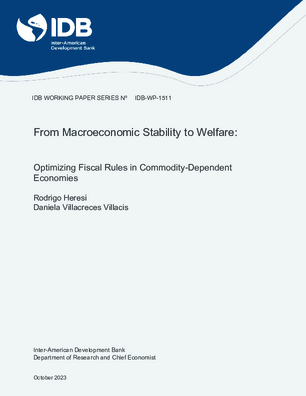From Macroeconomic Stability to Welfare: Optimizing Fiscal Rules in Commodity-Dependent Economies
Date issued
Oct 2023
Subject
Fiscal Policy;
Macroeconomy;
Fiscal Rule;
Economy;
Investment;
Tax Revenue;
Commodity Price;
Public Expenditure;
Small Business;
Wage
JEL code
E62 - Fiscal Policy;
F41 - Open Economy Macroeconomics;
Q32 - Exhaustible Resources and Economic Development
Country
Chile
Category
Working Papers
We study the welfare and macroeconomic implications of simple and implementable fiscal policy rules in commodity-dependent economies, where a large share of output, exports, and government revenues depend on exogenous and volatile commodity prices. Using a multi-sector New Keynesian model estimated for the Chilean economy, we find that the welfare-maximizing fiscal policy involves an actively countercyclical response to the tax revenue cycle. In contrast, the optimized response to the commodity revenue cycle is procyclical, given the high persistence and the economic dynamics induced by international commodity price shocks. The optimized fiscal rules deliver significant welfare gains of 0.52% of lifetime consumption for non-Ricardian consumers and 0.06% for Ricardian consumers relative to a benchmark acyclical policy. Lump-sum social transfers are the best instrument to implement the fiscal rule, yielding higher welfare gains, enabling reductions in macroeconomic volatility, and producing only moderate additional volatility in government spending.
Generative AI enabled




